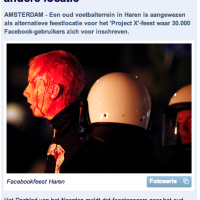Yesterday, results were published by a committee that was tasked with investigating riots in the village of Haren. Part of that task was to study what role Facebook played in these riots. They didn’t do this. Instead, they analysed Facebook posts.
September last year, Rob Bats, mayor of the municipality of Haren, reacted hysterically to a birthday party invitation on Facebook, which several hundreds and eventually thousands of users had jokingly indicated they would attend. The frightening thing was that this was the first time during his tenure that he was confronted with an online call to visit his municipality. What he should have done was treating this situation like a traditional order and security issue, but the fact that it originated from Facebook caused confusion for him.
It was the usual: you get an invitation on Facebook, sent to you by a friend who has been invited by a friend, and you’re asked to indicate whether you’ll be there or not. To an above-average Facebook user, it can happen on a daily basis, sometimes to the point of annoyance. ‘Attending’ here is a matter of clicking a button and doesn’t at all mean you’ll actually be present at the actual event: for Michael Jackson’s funeral there were around 20 million virtual ‘attendees’, but of course they weren’t all there in reality.
But the municipality of Haren didn’t know that, and so they panicked about how to handle a ‘Facebook event’ with between hundreds and thousands of virtual ‘attendees’, their imagination stimulated further by the invitation making references to ‘Project X’, a film about a party going horribly wrong. The first weeks after posting this Facebook invitation, this didn’t lead to any explosion of posts about this ‘Facebook party’. That only happened two days before the riots, and Facebook was barely involved in that.
Ask any teenager and they’ll tell you it’s easy: just change the date and time to a day that’s already passed (setting the event to ‘passed’ too) and delete the address, and maybe send a message to everyone who said they would be attending to tell them it’s been cancelled, and then delete the event. No rioter would have copied the date, time and address into their agendas or maybe even remember the event. Optionally you could keep an eye on social media for clues about any concrete plans by any individuals or groups, in order to be well prepared.
Instead, they made it seem like total chaos by announcing a local emergency ordinance, indicating they would keep it at the ready for the time being. There would be no party, but alternate party options were being prepared and artists were already offering to be part of it. Disaster tourists would not be welcome, but were still allowed into the municipality with various narcotic treats — as we could see on a Livestream feed from a seventeen year old boy with an average of 50,000 viewers for hours. Then, news websites reported that the municipality had reserved a sports field as an ‘alternate party site’ and equipped it with two mobile light masts. Did you even remember at that point what was going to happen? Or just that something was going to happen?
And yet it still wasn’t too late. The authorities still could have prevented Haren from becoming the national hot item for days by issuing a single announcement about measures being taken (ban on assembly, ban on alcohol, riot control teams at the ready), instead of feeding the hype with daily interviews and courses on removing street signs — which teenagers in the year 2013 really don’t need any more to find their way.
Unfortunately none of that would have made much of a difference in this case: once the news spread that the municipality had arranged a sports field with light masts for an ‘alternate party’ — a downright invitation — you wouldn’t even have needed social media like Facebook in order to ensure people would flock to the tiny municipality.
An analysis of social media posts about Haren, Project X and the birthday girl Merthe proves that Facebook has really been the most negligible of all the factors involved: almost all of it was posted on the two days before the riots, when everyone was already talking about it, and not during the weeks leading up to them. Moreover, Facebook itself wasn’t even accessible from Haren during these so-called Facebook riots due to cellphone network overload.
Facebook as a company, website or platform has played absolutely no independent role or key role in the Haren riots at all. Unless Facebook has become synonymous with ‘us’.

Leave a Reply